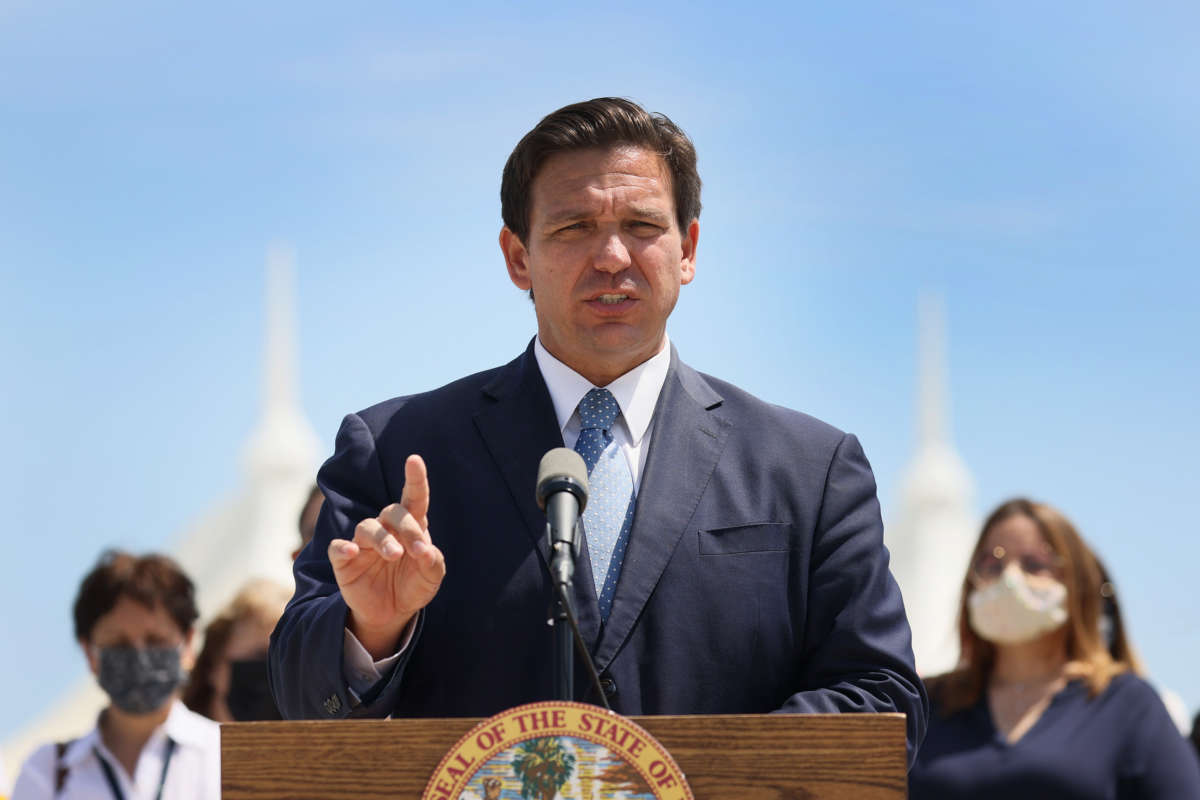Gov. Ron DeSantis (R-Florida) signed a controversial bill into law on Monday that diminishes First Amendment speech and protesting rights. The bill increases civil penalties for those participating in demonstrations, potentially causing those engaged in uprisings or protests to lose their voting rights if they are convicted under its provisions.
The legislation, billed as an “anti-riot” measure by its Republican proponents, would create new crimes, including making “aggravated rioting” a felony and “mob intimidation” a misdemeanor. The latter makes it illegal for a group of three or more individuals to confront others and intimidate them into changing their views — a provision that has the potential to be broadly interpreted, say critics.
During the signing ceremony for the bill, DeSantis tried to justify that specific provision using questionable rationale while recalling a viral video in order to make his point.
“We saw images of people just sitting outside eating at a restaurant,” DeSantis said. “Then you have this crazed mob circle around them and start screaming and really intimidating. I’m sorry that’s unacceptable. You’re gonna be held accountable.”
The video to which the Florida governor is referring, however, involved protesters who were walking up the street and restaurant patrons, not demonstrators, being the aggressors as they shouted anti-Semitic slurs at the protesters. The video of the incident went viral in right-wing circles because it omitted actions of those at the restaurant and focused solely on a few peoples’ responses to their hateful conduct.
It is possible, under a broad interpretation of the new statute, that the individual in that video and others defending themselves against hate speech could be charged with mob intimidation.
DeSantis also tried to justify provisions of the law that limit local municipalities from defunding their police departments and using those funds for social services projects, claiming that places that have already done this in Florida have “seen crime go up.” A fact-check from WMNF Community Radio, however, found that “there has been no reported evidence linking spikes in crime to reductions in police budgets,” contradicting DeSantis’s claims.
Beyond those new laws, the bill also goes on to establish stiffer penalties for already existing statutes, including making it a felony crime (rather than a misdemeanor) to block traffic on a highway during an uprising. Individuals arrested for “riot” related crimes will also not be able to post bail until their first court appearance.
Because of a federal circuit court opinion last year, those convicted of a felony crime under this new law could face serious repercussions, including losing their right to vote even after completing their sentence.
The law is dangerous in other ways, too, in that it grants protections to people who use violence against demonstrators engaged in uprisings or protest events. Under the law’s provisions, those driving on a road or highway while a protest is occurring are granted civil immunity protections if they drive their vehicles into the crowd, causing harm to those taking part in the demonstration. This is similar to an Oklahoma law that was recently passed by the state legislature, which also provides protections for drivers who use their vehicles to harm groups exercising their First Amendment rights of speech and assembly.
There has been widespread criticism of the new law over its many controversial provisions.
DeSantis has “made it more dangerous for the people here in our state, who want to stand up against injustice, and make changes to society,” Florida Agriculture Commissioner Nikki Fried, a potential challenger to DeSantis, said.
In a tweet on Monday, Fried added that the new law signed by the governor “is a flagrant assault on freedom that criminalizes peaceful protests.”
“This will move Florida backwards on social justice, silencing voices only asking that their lives be valued the same as other Americans,” she wrote.
Adora Obi Nweze, president of NAACP Florida State Conference, also described the law as being “racist, discriminatory, unwise, unlawful, and unjust.”
“The Governor put his stamp on this discriminatory law filled with criminalization and civil rights disenfranchisement aimed at Black and Brown Floridians,” she added. “We won’t sit silent on this issue and we won’t let this stop peaceful protests across the state of Florida.”
We have 10 days to raise $50,000 — we’re counting on your support!
For those who care about justice, liberation and even the very survival of our species, we must remember our power to take action.
We won’t pretend it’s the only thing you can or should do, but one small step is to pitch in to support Truthout — as one of the last remaining truly independent, nonprofit, reader-funded news platforms, your gift will help keep the facts flowing freely.
